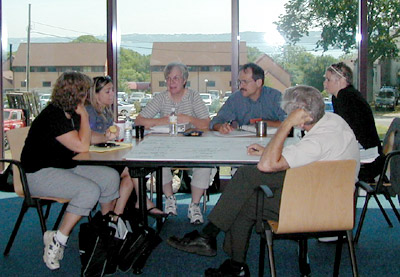| Key
Activities | Challenges
| What We Learned
Spreading
the Message: What we Learned
|

|
Maine Inhalant Task Force subcommittee
at planning retreat
|
Our
experience has been rich with lessons learned. We pass these along
to anyone interested in replicating our approach.
Partnerships
work
Who delivers the message – and how they do it – is key.
Since we want the message to children to emphasize that inhalants
are poisons, toxins and fire hazards (and not suggest that they
are drugs that give a high), then it is most appropriate that poison
center educators or fire safety educators take the lead in addressing
the youngest audiences, rather than substance abuse personnel.
With
task forces drawing heavily from the substance abuse prevention
infrastructure in each state, it became crucial for them to partner
with poison and fire professionals. We found that substance abuse
people often took the lead in coordinating messages to parents,
other professionals, and the media, while the elementary and middle
schools became the target of fire and poison educators and school
nurses.
Institutionalize
inhalant abuse prevention
We've learned how necessary it is to take the time to explain about inhalants to professionals so that they can eventually recognize and address the problem in their midst. Don't underestimate the importance of teaching professionals about inhalants, and building the trainings into professional training days, ongoing conferences, and credentialing processes. Librarians can be trained to use guidelines for screening inhalant materials. School purchase agents may be trained about purchasing safer products. Licensing for facilities should follow inhalant-free environment licensing guidelines.
Prime the pump
Because inhalant abuse is not widely understood even by substance abuse prevention professionals, we found that we often needed to "prime the pump," that is, use brief trainings to build motivation to learn more about inhalant prevention practices.
Reach
parents
Inhalant prevention may be the ideal vehicle to help parents start
talking about risks with their very young children. When parents
talk about inhalants as poisons or dangerous things and that dialogue
starts early in the child’s life, then you’re setting
a pattern for talking with them about risky behavior when they are
teens. Inhalant prevention offers us the opportunity to have a dialogue
with parents and help them begin the dialogue with their children.
|





